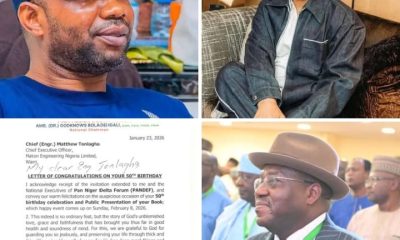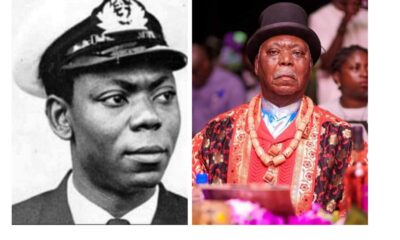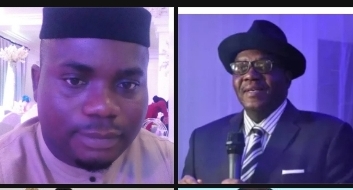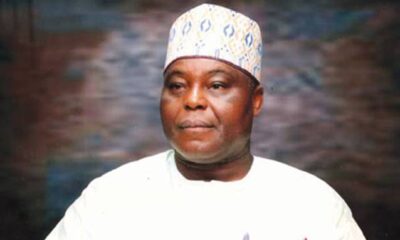Opinion
HISTORY AND THE HISTORIAN: PROFESSOR E.J. ALAGOA AT 90.
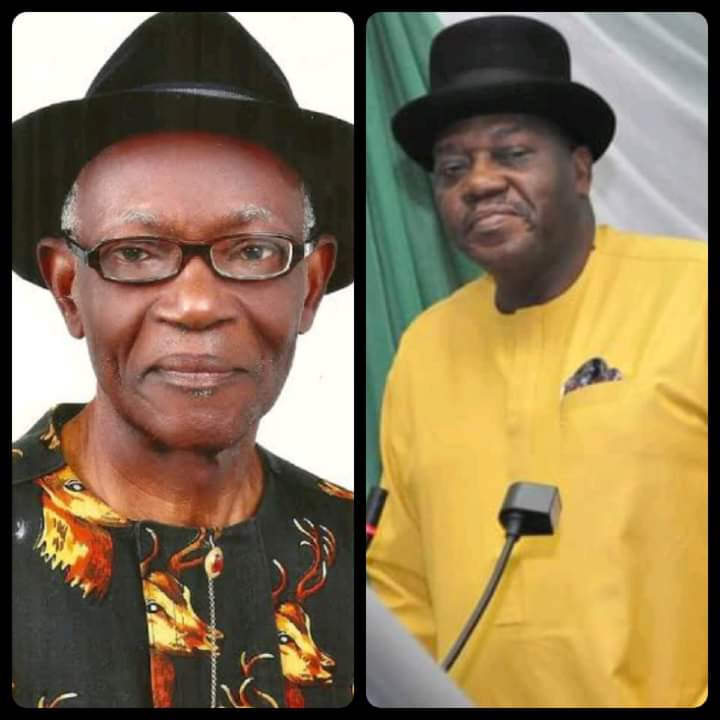
History and the Historian: Professor E.J. ALAGOA at 90.
HISTORY AND THE HISTORIAN: PROFESSOR E.J. ALAGOA AT 90
By: Godknows Igali
In a great show of what is referred to in Latin as ‘Opus Laudatio’, – preeminent praisework, the Nigerian nation gathered in Yenagoa on Saturday August 26, 2023, to celebrate one of the country’s living legends, Professor Emeritus Ebiegberi Joe Alagoa. Earlier, on April 14, 2023, this historian of lauded value and history teacher attained the milestone 90 years of age. For a man who is naturally reserved and of much tempered manners, the actual birthday rolled by largely unnoticed. But he was however ambushed on that occasion and deservedly toasted and honoured being one of the “Last Men Standing”, amongst his generation of historians of great minds. Interestingly, despite his riped age, on that day, his new book, ‘Ebisuote’ – an arcane work on the love which he shared with his departed wife, Dame Mercy Alagoa was unveiled.
WHAT REALLY IS HISTORY?
2. The celebration of this personality regurgitated many minds on what History is all about and what historians like the illustrious Alagoa are to society and to our collective human experience.
3. The truth is that, from the days of Greek civilization, some 3,000 years ago, this question has reoccurred. Indeed, notable philosopher, Heroditus now known as the “Father of History” and his contemporary, Thucydides, debated, often differing, on the significance of what History is all about. Generally speaking, to many, History is just about exploits regarding physical territories, lands and related geomorphic themes. For example, we vividly recall the nature and extent of the lands acquired by Emperor Gengis Khan of Mongolia, who arrogated to himself the title of “Oceanic, Universal Ruler” and had the single largest contiguous territories in human history. Same way we remember the story of such persons as King Cyrus the Great of Persia, who called himself “the King of the world”. There were also Alexander the Great of Macedonia, as well as Emperor Napoleon Bonaparte of France, who is remembered to have wept profusely because there seemed to be no more known territories available for him to conquer.
4. Coming closer home is perhaps the varied accounts of lands acquired by our own Emperor Askia Mohammed of Songhai empire, known more as Askia the Great, His empire covered a good part of West Africa; In Nigeria, there were legends like Oba Esigie the Great of Benin Empire whose territorial stretch covered the forests and swamps of much of what is today known as Southern Nigeria and parts of Dahomey (Republic of Benin) or Queen Amina of Zauzau, Sheikh Othman Dan Fodio of the Sokoto Caliphate and King Jaja of Opobo, amongst other great warriors. Similarly, in Southern Africa, there was Chaka the Zulu who held sway in the region in the 18th Century.
5. Unfortunately, this territorial emphasis about the past is totally restrictive and should be rightly claimed by geographical sciences which deal with environment, spaces and peoples. In real sense, history is not just about territories.
6. In a related development, others associate history with just cultural and traditional expressions/expositions. So they count such activities as religion, dances, masquerades, ritualistic expressions of various forms, including: rites of passage, rites of succession, rites of inheritance and just tales, fables and the likes as History. No doubt, these are very close and most of their contents are overlapping with history and historical value. However, such forms of human expressions, strictly speaking, lie within the frontiers of Anthropology, Sociology as well as within the terrain of Literary Arts.
7. So what really is History?
A RETURN TO ALAGOA’S “FIRST” INAUGURAL LECTURE
8. The search for the meaning of History therefore takes a backward bearing to the first Inaugural Lecture at the University of Port Harcourt delivered by Professor Alagoa himself. Although the University had been established since 1975 as a campus of the University of Lagos, the first set of pioneer students were admitted in 1977. However, this first inaugural lecture was to be delivered by a long tenured professor and took place in 1979, two years into the effective take-off of the institution. It must be clarified that UNIPORT authorities at the time, as against normal convention, where new professors show off their academic prowess with inaugural lectures, co-opted a 7 years tenured Professor Alagoa to take on the task in the presence of his peers, almost all of whom have departed.
9 The Inaugural Lecture tried to explain what history is from three rather absurd aphorisms. These are:
a) History as “The Python’s Eye”
10. Alagoa’s much awaited inaugural lecture was strangely entitled “The Python’s Eye: The Past in the Living Present”. Now 44 years down history, it would be otiose to go into details of the lecture as we try to define History. However, the kernel of the work was the fact that unlike most other reptilian ophidians (large snakes) who depend mostly on their tongues for information on the environment around them, the morphology of the eyes of several python species, allows it to have both anterior and posterior views at the same time.
11. Alagoa’s metaphor of the Python’s Eye is not amiss. Born April 14, 1933, in the swampy town of Okpoama, in today’s Bayelsa State of Nigeria, he is the son of a respected noble Nembe man of royal birth, Chief Joseph Ayibatonye Alagoa. He was therefore raised in Nembe Kingdom of Nigeria’s fourth largest group – Ijaw ethnicity. Amongst the Nembe people, the python still remains a totem to traditional worshippers and until recent times, was a common site co-mingling unperturbed with the human population. Pythons and their mannerisms were therefore known fully and understood by all in the society. Amongst other things, the people knew pythons for making informed decisions on issues depending on their often very empirical judgment about happenings around them. This is usually based on what they see from all views. Pythons are also full of tack, gait and discretion once they have seen from both the back and front and they often never blunder.
12. Apart from relying on his Nembe origins in trying to define History, this first generation scholar took the epithet of the Python’s Eye directly from a proverb of the people of Ikwerre ethnicity, which says “anya diali bu anya eke” – the eye of a man with local roots is (as penetrating as) the python’s eye. The Ikwerre people, though largely settled in the more upland fringes of the Niger Delta, as well documented by the great writer, Captain Elechi Amadi in his several works, are equally riverine. Their language is quite related to the Igbo language, but most of their traditional and cultural habits are similar to the Ijaws, their neighbours. The deification and totemism associated with the python is common in several Ikwerre clans. For example, in Rumuolumeni community, in the precincts of Port Harcourt, where one of Ikwerre land’s most venerated deities ‘Okemini’ exists, the royal python occupies a special place in their worldview. In some communities in Imo State sharing boundaries with the Ikwerre people as well as far-fetched communities such as Idemili in Anambra State, the python is equally regarded as an object of worship and known for similar characteristics as attributed by Alagoa.
13. It may be, perhaps, arguably, that the veneration of python or similar endangered species of animals by our traditional societies in Africa, is some ingenious form of conservation indigenously developed by our ancestral past. Maybe deeper studies need to be conducted on such occurrences by relevant experts. Anyway, Alagoa’s symbolism of history being seen within the context of the python’s globular organs makes meaning against the backdrop of these close human interfaces with this reptile. The historical value which the various peoples attach to this creature’s ability to take good decisions, especially while hunting, devoid of impulsive considerations, underlies Alagoa’s definition of History.
14. Reading Alagoa’s inner mind appears to be the gravamen of historical endeavour that is looking back, making a fairly objective and accurate interpretation of the past and relating them to current circumstances. In so doing, either consciously or often unwittingly, History helps in predicting the future.
b) History as “The loud steps of ants”
15. The related sub-theme as it pertains to understanding the import of History from Alagoa’s inaugural lecture was the axiomatic reference to the “throbbing footsteps of the ants”. Ants? Yes.
16. Some species of ants are amongst the tinniest living creatures on earth. Yet, they are known for keeping strict social habits and civic organization. This is to the extent that even the Holy Bible states inter alia “Go to the ant, thou sluggard, consider her ways and be wise…the ants are a people not strong, yet they store provisions in summer and gathers their food at harvest…” (Proverbs 6:6-8).
17. Alagoa again goes to the Ikwerre culture to borrow an ancient idiomatic nugget. His obsession with Ikwerre worldview is perhaps due to the fact that UNIPORT is located on its soil. In this instance, he brought out a proverb which translated literally from the Ikwerre language, means that “a perceptible listener, who places his hears pointedly to the earth will hear the loud marching, steps of the ants”. To achieve that, or hear the supposed footsteps of a miniscule ant, one must be fully attentive. That is enough to capture the movements and perhaps even gauge the strength of numbers of ants, and the direction of their movement. He therefore insisted that History is being able to distill the past with razor sharp accuracy, similar to hearing the loud noise being made by ants as they match daily. What great ancient African wisdom!
SO, IS HISTORY A SCIENCE?
18. Some argue that if History is so sharp and precise, like Mathematics, does that make it a Science? The word “historia”, from which the discipline derives its name, means “inquiry or knowledge acquired by investigation”. So, whether from the perspective of Alagoa’s recourse to African traditional knowledge or from its Greek origins, the ‘Historian’, being the professional, either traditional or western trained, must look back effortlessly and must also be objective and adeptly analytical.
19. According to the Wikipedia Free Encyclopedia, the historian’s tool is “systematic, sequential, logical and progressive in clearly defined steps”. He must resist the temptations of emotional subjectivism, exaggerations and sensationalism.
20. On account of its organized and systematic nature, Herodotus the first lettered professional in the field, thousands of years ago, considered History as a Science. This is same for the leading 18th century Oxford Professor of Modern History, J.B. Bury, who stated that “History is a science, no less, no more”. He considered history to be a data bank established and verified by research techniques. Perhaps it is for these reasons that several authorities especially from the ‘Oxford School’ of Historians even in contemporary times still stress the scientific nature of the discipline.
21. Perhaps a unifying view would be to suggest that the practice of history should simply be the synthesis of a deeply humanistic preoccupation, that is, dealing with human activities, interpreted through the deployment of multiple tools, quite a number of which are scientific. Alagoa and many pioneers of his generation tried to do so, especially in our hitherto preliterate societies, rendering the past almost entirely in oral literature or other forms of artistic expressions, thereby providing interpretations that were scientific and empirical enough to be of historic value.
22. One is further inclined to suggest, that the study and practice of History must unclasp itself from the strictures of academic compartmentalization, viz, Art or Science. The dividing lines must only be seen as guides. More so, in a world where some forms of science, especially telecommunication, even chemistry and biology creep into every human endeavour. So the historian must obliterate these lines and be able to work within the wider search for knowledge.
A YOUNG NEMBE BOY AND THE ‘IBADAN UNIVERSITY SCHOOL’
23. Nembe kingdom in which Alagoa grew up was one of the largest and most renowned political dominions in the coastal belt of Nigeria. Alagoa himself inherited an important chieftaincy stool “Kala-Joe” from Ogbolomabiri, the seat of the kingdom’s monarchy.
24. His father, Joseph Alagoa, a renowned Chief was like many of his Nembe kinsmen of his era, an adept trader. At the time the senior Alagoa was born in the 19th century, Nembe became greatly famed for its strategic position in the palm oil and kernel trade which replaced Slave Trade in 1884. The area was then declared as a British administered “Oil Rivers Protectorate” (1884-1893) and later the “Niger Coast Protectorate” (1893-1900). At the time of the proclamation of treaties, the Nembe kings and chiefs, unlike their counterparts in other neighbouring areas refused to be subservient to the evidently retrogressive policies of the British Crown and its chartered Royal Niger Company. This culminated in the 1895 stand-off between them, led by King Frederick William Koko (Mingi VIII), (1853-1898) and the British in what is today known in Nigerian history as “The Akassa Raid”. The historical accounts, Alagoa has well documented in his books “King Boy of Nembe” and “Small Brave City-State”. King Koko learnt of the earlier abduction of King Jaja of Opobo by the British in 1887 and Chief Nana Olomu of Itsekiri in 1894. Interestingly, in December 1897, British gun-boats raided Oba Ovonranwen’s Benin Kingdom. But Alagoa’s forebear, King Koko avoided giving the British the pleasure of capturing and exiling him like his other friends, by committing suicide in early 1898.
25. The European conquest of Africa towards the end of the 19th century brought to the front burner the systemic study of some disciples in the newly established schools at various levels in the colonies. For example, Geography became emphasized to enable them understand the physical terrain of the new territorial possessions while the study of Social Anthropology came in to help know the human life forms and inter-relationships. Above all, there was the study of History. History was particularly important as it enabled the colonial authorities to place the various peoples in time and space. Besides, most of the colonial officials had their educational foundations in the Liberal Arts, especially History, Anthropology and Classics.
26. The Faculty of Arts in the early years of the University College, Ibadan when it was established in 1948 was particularly vivacious. Amongst others, the types of Chinua Achebe, Gamaliel Onosode, Emeka Anyaoku, Wole Soyinka, JP Clark, Christopher Okigbo, in addition to the history-flaunting folkes like Ade Ajayi, Tekena Tamuno, Emmanuel Ayandele, Sabiru Biobaku, Obaro Ikime, Gabriel Olusanya and Adiele Afigbo.
27. The young Nembe prince, Ebiegberi Alagoa was of the 1958 set and graduated at the young age of 25, coming out on top with an Honours Degree. His first-rate performance at Ibadan was not startling as he had left a similar record at St Luke’s Primary School, Nembe, where in 1948 he left one of the most impressive results since the school was established by Bishop Samuel Ajayi Crowther in 1872. When he proceeded to Government College, Umuahia, which at the time was the equivalent of Eton College in England, from when it came into being in 1929, the rather studious Alagoa again left footprints which remained reference points for many years.
28. While in Ibadan, he was greatly influenced by some pioneers of the discipline like Prof Kenneth Dike (1917-1983) and Prof Saburi Biobaku (1918-2001) who succeeded each other as the first and second indigenous Heads of the History Department. Dike, amongst other things, helped found the Historical Society of Nigeria (HSN) and was also the founder of the Nigerian National Archives. Famously, his book, ‘Trade and Politics in the Niger Delta 1830-1885’ dealt extensively with the 19th-century geostrategic and gun-boat diplomacy in the Oil Rivers area. This seminal work in contradiction to European texts and reports, focused on exogenous issues from African perspectives; in this case by the various people of the Niger Delta to rebuff the incursion and invasion of their societies by European imperial powers.
29. Rather restless, Prof. Dike was also the brain behind the emergence of what became known as the ‘Ibadan School of African History’. Located within the University, this adept gathering of scholars devoted itself to the promotion of the study of African History by African scholars and the authentication and valorization of Oral Tradition as a credible source of Historiography. The Ibadan School also had other pioneers of European origin such as Professor Michael Crowder (1934-1988), Professor Robert Smith (1919-2009) and Professor John Webster. In all these, one of its shining stars was the young man from the creeks, Alagoa.
30. The role of the Ibadan School was akin to the pioneering work of first Senegalese President and chief exponent of the Concept of Negritude, Leopold Sedar Senghor (1906-2001). His thoughts and works brought to the fore the historic role of the ‘Grout’. This was the ultimate oral literary maestro, who, under oath, had to preserve peoples’ past stories especially in the Senegambia valley. In most courts in centralized political domains in Africa, similar court historians, in most cases hereditary, existed and the performance of their duties were bound by traditional dictates of truthfulness and accuracy. Even in the less organized group, the village, or clan, historians were often held in esteem and veneration, almost in the same level as priestly class for their strict adherence to the dictates on integrity and truthfulness.
ORAL TRADITIONALIST PER EXCELLENCE AT WORK
31. The churning out of graduates in the Humanities, especially History from the University of Ibadan in the 1950s and early 1960s saw an upsurge in the appetite for the proper recording and presentation of the past history of the various tribes in Nigeria. It should be stated here that it was very few of the Nigerian communities, perhaps those which came in contact with Arabic civilization that the past was recorded in any written text. So, for the rest, Oral Tradition provided the medium of reckoning of the past. One author defined oral tradition thus: “a form of human communication wherein knowledge, art, ideas and cultural material is received, preserved, and transmitted orally from one generation to another. The transmission is through speech or song and may include folktales, ballads, chants, prose or verses”. This is what these seeming academic mutineers from the “Ibadan School”, black and white, began to promote.
32. So, after completing his studies at the University of Ibadan, Alagoa, who had secured a job at the National Archives of Nigeria, thanks to Prof Dike, proceeded to the American University, in the United States for more specialized training. There, he obtained a Certificate in Archives Administration in 1959. Such specific expertise was greatly needed at the National Archives which until 1958, had been part of the University of Ibadan. Its leadership remained under Prof. Dike who was pioneer Director from 1954 to 1963, and was there to see Alagoa sail out of the shores of Nigeria to America for more knowledge.
33. With his additional knowledge and skills on archival management, he soon stood out among his peers at the national repository. However, still searching for knowledge, Alagoa, obtained a study leave to pursue a PhD at University of Wisconsin, USA till 1966. Although his experience at the archives exposed him to a lot of written texts from European explorers, missionaries, colonial officials among others, Alagoa’s academic inflections and emphasis again dwelt on Oral Tradition and use of folkloric and Afrocentric sources. This formed the content of his doctoral work.
34. With the completion of studies, his initial academic sojourn oscillated between Lagos, then Nigeria’s capital city and his familiar town of Ibadan. So, he moved over briefly to the University of Lagos, (UNILAG) as a Lecturer in African History, 1965-67, but went back to his former school, University of Ibadan, Nigeria, as a Senior Research Fellow at the Institute of African Studies shortly. He lived in Ibadan up till 1972 and upon promotion, went back to the University of Lagos as Professor of History and Director of the Centre for Cultural Studies. After five years at UNILAG and with the take-off of academic programmes at the University of Port-Harcourt (UNIPORT) in 1977, he accepted to come nearer home as pioneer Dean of the School of Humanities and Deputy Vice Chancellor. When his principal, the Vice Chancellor, Professor Donald Ekong, a foremost Chemist, completed his tenure and left in 1980, he acted in his stead for one year, that is, till 1981, but remained the substantive Dean of the School of Graduate Studies from 1982 to 83 and later from 1985 to 87.
35. As UNIPORT took form over the years, Alagoa became the pioneer Chair of the Faculty of Humanities of the Niger Delta Research Group, 1990-98. In the course of time, he was also a Visiting Scholar at the Frobenius Institute in 1989; as well as the Resident Scholar at the Bellagio Study and Conference Centre, in 1990; and Research Scholar at Brown University from 1993-94.
BOOK, BOOKS AND BOOKS
36. The people of the Niger Delta, especially Benin Kingdom, the Itsekiris, and Ijaws were the first to make contact with Europe. So, as early as the 1460s when the Portuguese came into Benin, a few persons, especially from royalty became lettered, but this educational development and its benefits was interrupted for 400 years due to the ravaging slave trade and other factors. However, Christian religion and western scholarship came back to such places as Bonny, Nembe, and the Efik territory in the late 18th Century and early 19th century. With colonial conquest, reports by European writers of various sorts therefore began to emanate in some archival sources such as government sponsored Intelligence Reports. There were also earlier documented texts from oral history such as Chief Jacob Egharevba’s 1936 book, A Short History of Benin and Chief S.K. Owonaro’s History of Ijo (Ijaw) and Her Neighbouring Tribes in Nigeria, published in 1949. However, trained accounts by scholars were scanty. It therefore behoved on the likes of Alagoa to source, record and properly publish the history of the region.
37. From the date of his first graduation, Alagoa took on the gauntlet and carved out a niche for himself as one of the leading Nigerian scholars on the practice and use of Oral Tradition, as the preferred source of historiography of the people of Nigeria. Soon, he came up with countless books on the history of various themes, related to the lands and peoples of the Niger Delta region. At a time when literary works were manually done, he stood out in the country and around global academic circles for his tirelessness in writing continuously.
38. Unlike most of his contemporaries, he has since churned out over 168 major works, most of which are published in at least 4 languages.
COMMUNITY AND NATIONAL HISTORICAL SERVICE
39. Outside core academic circles, Alagoa also remained greatly involved in historical research and community service. In this respect, he was Member of the Nigerian National Archives Committee, 1966-70; National Antiquities Commission, 1972-76; National Council for Arts and Culture, 1975-76; and later served as a member of the Nigerian Television Authority, from 1984-86; the Nigerian Copyright Council from 1989-93, and the Nigerian National Merit Award Board from 1998-2001.
40. Back home in the old Rivers State, he was Chairman of the State’s Council of Arts and Culture for four years from 1972-75. He was at various times, a member and later Chairman of Rivers State Chieftaincy Board of Inquiry and Rivers State Chieftaincy Review Commissions, respectively, from 1975-76.
41. While being engaged in government responsibilities that bothered on historical facts, he was also saddled with bringing value to the tertiary education sector serving as Member of the Governing Council of the Rivers State College of Science and Technology, 1972-75; and pioneer Pro-Chancellor and Chairman, Governing Council of the Niger Delta University, Bayelsa State, in 2001. At present, he is Chairman of Governing Council of the Edwin Clark University, Kiagbodo, Delta State.
42. Perhaps one of Professor Alagoa’s greatest services was to the Historical Society of Nigeria where he is a founding member, Fellow and has been President for two terms from 1981-83 and later from 1991-94. Equally significant, is the fact that he also served as President of the Nigerian Association for Oral History and Tradition from 1985-94 and fellow of the American Anthropological Association.
ACCOLADES, APPRECIATIONS, HONOURS
43. From quite early in his academic sojourn, Professor Alagoa had attracted the notice and appreciation of the global academic community, often unsolicited. Accordingly, he became a Fulbright Scholar in the 1983/84 session and ten years later, that is between 1993-1994, was invited back to be a Senior, Fulbright Scholar. In-between in 1990, he was a Rockefeller Foundation Scholar. For any academic in Nigeria, worth his salt, one of the most approving accolades is the award of the fellowship of the Nigerian National Order of Merit (NNOM), an award Professor Alagoa so much cherishes. And in the year 2000, he was conferred with the national honours of the Officer of the Order of the Niger (OON).
DESIDERATUM
44. To numerologists, the number 90 symbolizes “time of spiritual awakening, enlightenment, inner-wisdom, and philanthropy”. These are also in sync with the demeanour of the Historian, Alagoa. He is an analyst per excellence and has outlived many of the pioneers of his generation as the most efficient and trustworthy historian. He has remained focused on research, studies, writing and the teaching of History.
45. In Alagoa’s own words, “The past may be dead, but we cannot bury it. There are some people who are ready to act as undertakers. And wish to see the past disposed of for good. There are others who have made it their business to see that the past does not completely disappear from our consciousness. I am pleased to be counted among this latter group”.
46. Indeed, Chief (Professor) Ebiegberi Joe Alagoa Kala-Joe is an awesome Ambassador; properly establishing and re-telling the past objectively, from traditional perspectives. None will controvert his towering legacy or the view of some that the types of Prof. Alagoa do not come too frequently in the land of men. At a time when our communities lack old men and women versed in knowledge of the history, tradition and culture, save for people like Prof Alagoa and his ilk, our entire past would have joined our ancestors to their graves.
47. Today, many Nigerians do not only have a past to recount and dig deeper, but an identity and a pride. Indeed, the job is now easier for younger Nigerians and African historians. For these, the entire Nigerian state will be eternally grateful to Chief Kala Joe, an ultimate hero of all times.
48. Happy 90th birthday, Papa.
This is abridged from the Birthday Anniversary Lecture delivered by Ambassador Godknows Boladei Igali, PhD, OON, FHSN, FNAH, FAIA.
Opinion
“Delta: Worst in Educational Institutions Distribution” – Mulade Declares as He Calls for Ijaw Inclusion
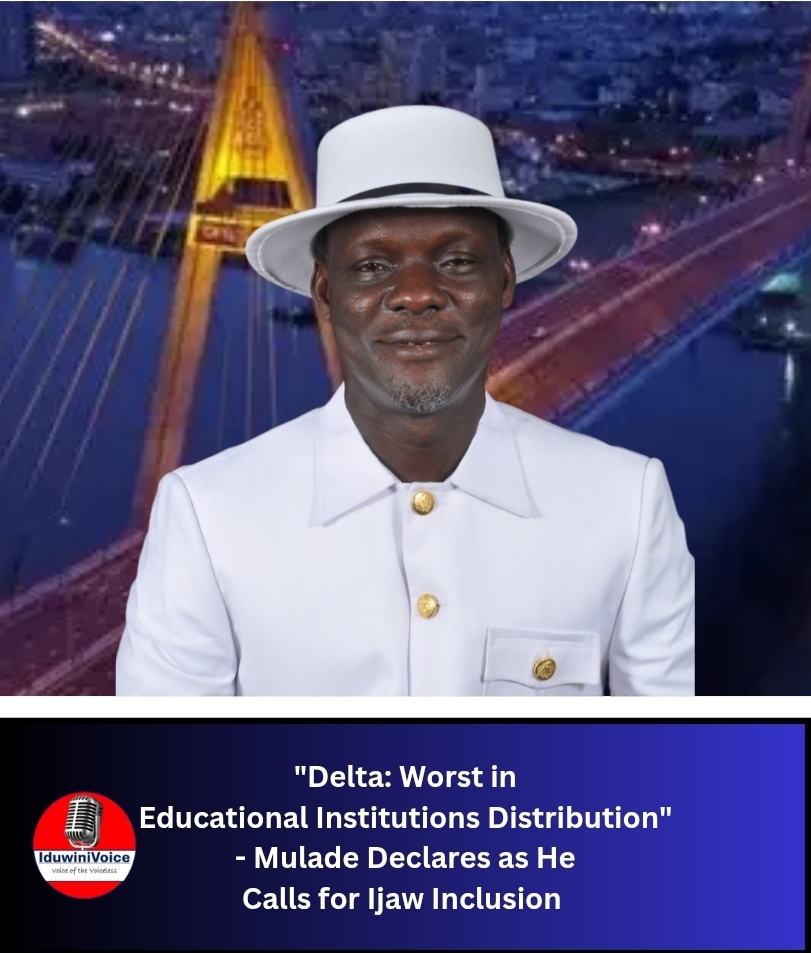
By: Favour Bibaikefie
A development Ijaw leader and development advocate, Comrade Mulade Sheriff, PhD, has accused the Delta State Government of systematic marginalisation and deliberate neglect of Ijaw communities, particularly in the area of educational development and institutional presence.
Mulade, who described the situation as “unjust, provocative and unacceptable in a democratic society,” said the continued exclusion of Ijaw areas from the siting of state-owned educational institutions represents a clear case of structural discrimination, despite the region’s enormous contribution to the economic survival of Delta State.
Dr. Mulade, “It is painful and unacceptable that a people whose land produces greater portion of wealth sustaining this state are treated as second-class citizens when it comes to development especially in the area of higher educational institutions. This is not only unfair; it is dangerous for the unity and future of Delta State.”
The Ijaw-born activist listed the existing state-owned tertiary institutions in Delta State and pointed out that almost all are concentrated outside Ijaw territories, reinforcing a long-standing pattern of exclusion as regards State-Owned Universities such as:
– Delta State University, Abraka;
– Southern Delta State University of Science and Technology, Ozoro; Southern Delta University of Science and Technology, Orerokpe Campus;
– Dennis Osadebay University, Asaba;
– University of Delta, Agbor;
– State-Owned Colleges of Education and Health Institutions:
– Federal College of Education (Technical), Asaba;
– College of Education, Edjeba Road, Warri;
– Delta State College of Physical Education, Mosogar;
– School of Midwifery, Asaba;
– State School of Nursing, Edjeba, Warri;
– College of Nursing Science, Sapele;
– Delta State-Owned Polytechnic Institutions:
– Delta State Polytechnic, Ogwashi-Uku;
– Delta State Polytechnic, Otefe-Oghara;
– Delta State Maritime Polytechnic, Burutu; (with the poorest infrastructure and lacks).
Mulade stressed that out of all these institutions, only one, the Delta State School of Marine Technology, Burutu is located in Ijaw land, a reality he described as “appalling, insulting and indefensible.”
“One institution for an entire ethnic nationality that contributes massively to Delta State’s oil wealth is not just marginalisation; it is a deliberate policy of neglect,” he declared.
The rights activists further lamented that while Ijaw communities bear the environmental burden of oil exploration including polluted rivers, destroyed farmlands and health risks, they are consistently denied the benefits of development, especially in education.
“Our youths are denied opportunities not because they lack potential, but because the government has refused to bring development to our doorsteps. This imbalance is breeding frustration, and must be corrected urgently,” Mulade warned.
The Ibe-Sorimowei of the ancient and oil-rich Gbaramatu Kingdom in Delta State, Chief Mulade Sheriff strongly appealed and called on Governor Sheriff Oborevwori to rise above politics, sentiment and take deliberate steps to correct the imbalance by prioritising the siting of new educational institutions in Ijaw areas, upgrading existing infrastructure and appoint qualified Ijaw sons and daughters as Vice-Chancellor and other principal officers in Delta educational architecture as compensation now.
“Governor Oborevwori must show that he is a governor for all Deltans, not for a select few. The Ijaw people deserve fairness, inclusion and respect. Educational development is not a favour; it is our right,” he stated.
He warned that continued neglect of Ijaw areas could deepen feelings of alienation and undermine the sense of belonging among the people.
Demand for Equity and Justice
Mulade concluded by calling on civil society groups, traditional rulers, youth organisations and stakeholders across Delta State to speak out against structural injustice and demand a more equitable distribution of development.
“This is not just an Ijaw issue; it is a justice issue. A state cannot develop sustainably when a significant part of its population is consistently excluded,” he said.
Opinion
Ijaw Nation Is Watching Delta State 2026 Budgetory Allocations – Dr. Mulade Warns
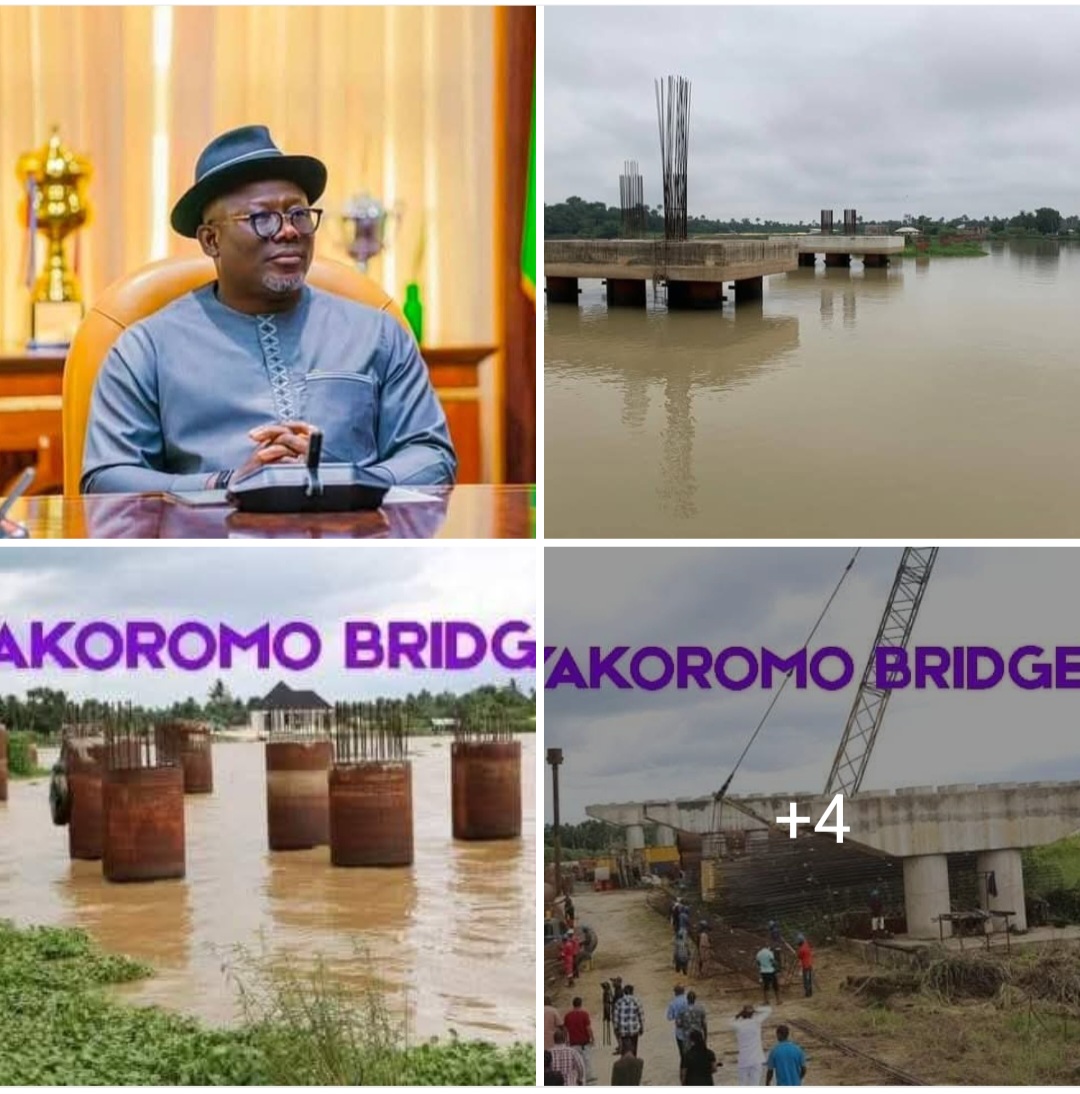
* As Group Gears Up to Endorse Governor Sheriff Oborevwori for 2027
By: Divine Perezide
Ahead of the 2027 general elections gradually inches closer, the political terain have seen a lot of endorsements at various levels. In Delta, there have been reports of a planned endorsement of governor Sheriff Oborevwori as the sole candidate by a group of Delta Ijaws. This has however, triggered reactions from many stakeholders, including a prominent Ijaw leader, peace and development advocate, Comrade (Chief) Mulade Sheriff, PhD, who has declared that Ijaw votes in 2027 would be determined by projects allocated, adequately funded to completion in the 2026 budget.
The renowned human and environmental rights activist made the declaration at a press briefing after an expanded stakeholders meeting in Warri on behalf of Ijaw Ethnic Nationality in the state.
According to the Ibe Sorimowei of the ancient Gbaramatu Kingdom, the adequate inclusion and funding of projects in the riverine areas will serve as critical consideration for political support, and riverine communities predominantly occupied by the Ijaws and Itsekiri ethnic nationalities.
While he commended the infrastructural development stride by governor Oborevwori in the upland areas, Mulade however lamented the absence of such infrastructural revolution in the riverine areas of the state despite the population density and huge revenue contributions to the state as host to multinational oil and gas companies.
He said, “I want to sincerely appreciate His Excellency, Rt. Hon. Sheriff Oborevwori, for the infrastructural development, which I described as infrastructural revolution in the state, particularly in the upland, and your proposed commissioning of the reconstructed Odimodi-Ogulagha road earlier constructed by SPDC in the 1980’s for their operational convenience and community residents.
“It is imperative to state that some Ijaw communities such as Ogulagha, Torugbene, Oporoza, Akugbene, Ojobo etc. are more densely populated than some local government headquarters in the upland, but they are deliberately deprived of development because of the so-called claim of terrain challenges.
“These communities host multinational oil and gas companies contributing immensely to the state revenue, but without any significant projects,” he lamented.
The Ibe-Sorimowei who reminded the governor of how the Ijaws adopted, supported and stood by him all through the election season, also gave the assurance of massive Ijaw votes come 2027, but one that must be backed by the governor’s commitment to development through massive projects inclusion for the area.
“We (the Ijaws) have created a conducive atmosphere to boost oil and gas production, making Delta the richest state; support security, douse restiveness and support economic stability. It is time for the governor to reciprocate through the 2026 budget with tangible legacy projects,” he asserted.
Speaking further he said, “Your Excellency, permit me to draw your attention to some expected critical projects that must be considered for the Delta Ijaw nation: the Ayakoromo bridge, Omadino-Okerenkoko-Kokodiagbene-Escravos road, Aladja-Ogbe-Ijoh Road, Ojobo-Torugbene road, among others.
“Build a first class Health Centre/General Hospital in riverine community, particularly at Ogulagha Town, to compensate the people for their huge contributions to the state revenue.
On education, he appealed that, “It is worthy of note that every ethnic group in Delta State hosts state university except the Ijaws and the Itsekiris. I want to strongly and sincerely appeal to His Excellency, Rt Hon Sheriff Oborevwori once again, to consider the upgrading of the Delta State Maritime Polytechnic, Burutu, which is a moribund polytechnic, to a campus of the Delta State University, Abraka. This will position the state to explore the blue economy opportunities. Equally too, the state government should, without delay, build a campus of Dennis Osadebe University at Koko to give sense of belonging to the Itsekiris with a special focus on agriculture for Deltans.
“The above mentioned projects constitutes significant live-wire for the Delta Ijaw, and will translate into votes come 2027. We can assure His Excellency, Rt Hon Sheriff Oborevwori, of 100 percent of the entire Ijaw votes come 2027.
“The consideration of revolutionary projects in the riverine areas in the 2026 budget will give a sense of belonging to the people for their huge contributions. Moreover, your commitment to development will write your name in gold, not just seeking their votes during elections.”
Opinion
“Tompolo: A Movement of Transformation” – Prof. Binebai,
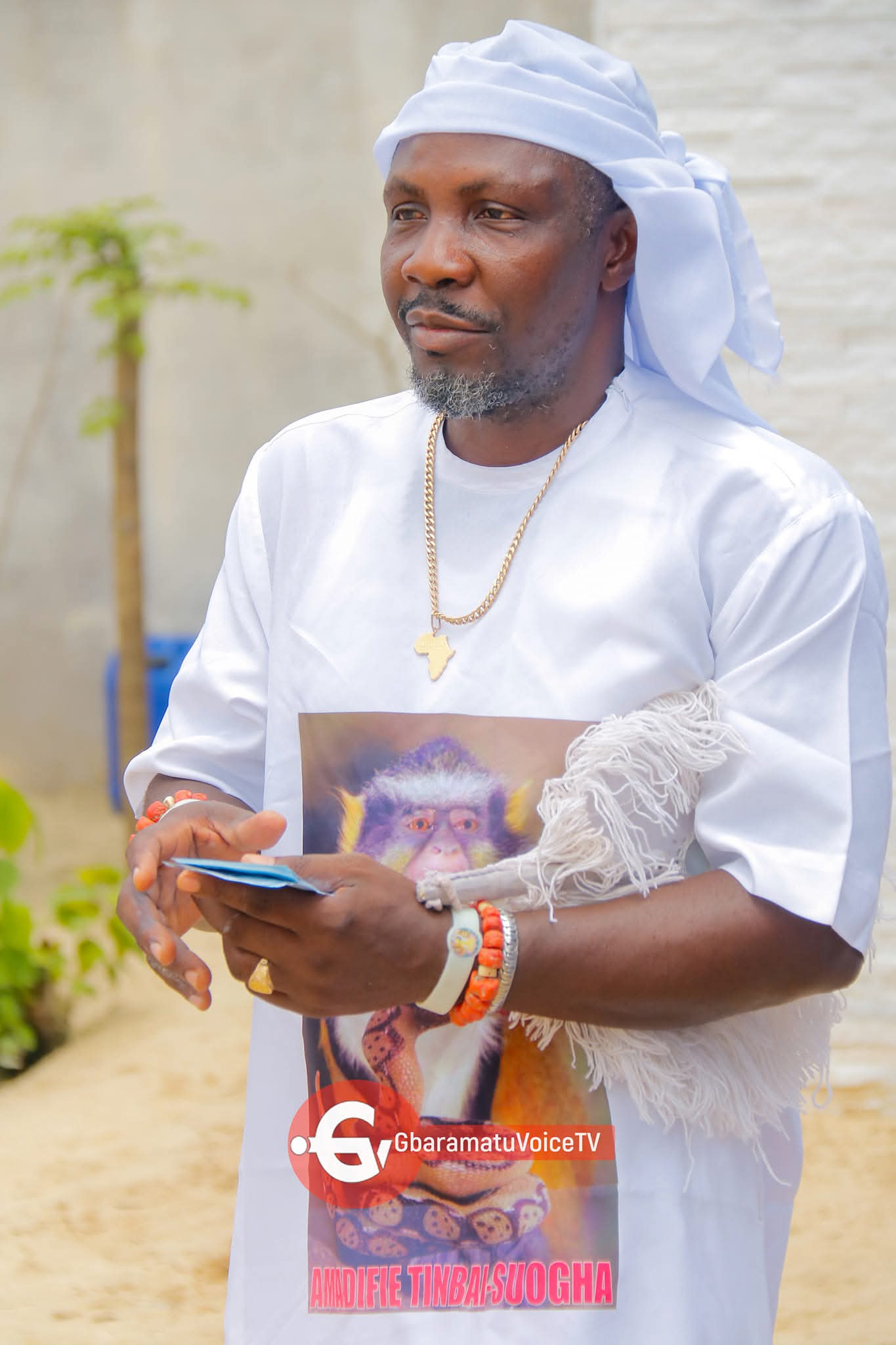
“Tompolo: A Movement of Transformation” – Prof. Binebai,
IduwiniVoice
Renowned Delta-born Professor of Professor of Drama, Dramatic Theory and Criticism, and an Auratorial god, Prof. Benedict Binebai has yet described High Chief Dr. Government Oweizide Ekpemupolo, popularly known as Tompolo as ‘A Movement of Transformation”
In his words, “Tompolo is a multifaceted entity, a veritable institution that defies categorisation, embodying a dynamic force that permeates various aspects of society. As an agency, it represents a powerful catalyst for change, driving progress and innovation in its wake. As a model, Tompolo exemplifies excellence, demonstrating a paradigm of leadership that is at once inspiring and aspirational. His influence extends far beyond the realm of politics, permeating the cultural, religious, and spiritual spheres, where he fosters a sense of unity and shared purpose.
“As a movement, Tompolo is a seismic force, shaking the foundations of complacency and stagnation, and galvanising individuals to strive for a brighter future. His impact is felt across generations, as he empowers young and old alike to become agents of positive change in their communities. In the realm of politics, Tompolo’s leadership has been characterised by a commitment to justice, equality, and the empowerment of the marginalised. His vision for a more equitable society has inspired countless individuals to work towards a common goal, forging a sense of solidarity and shared humanity.
“Culturally, Tompolo has been a luminary, celebrating the rich diversity of Nigerian heritage while promoting a sense of national identity and pride. His influence has helped to preserve traditional values while embracing modernity, creating a unique blend of old and new. Spiritually, Tompolo’s message of hope and redemption has resonated with people from all walks of life, offering a sense of solace and comfort in times of uncertainty. His leadership has embodied a sense of compassion and empathy, inspiring a new generation of spiritual leaders to follow in his footsteps.
“In every sense, Tompolo is a transformative force, a shining example of what can be achieved through dedication, perseverance, and a commitment to the greater good. He is an impeccable movement because his philosophy, his love for society, his cultural activism, his religiosity and leadership grace and skill which is human centered is attracting a large followership, particularly in the Nigerian Delta, where his impact is deeply felt.”
This assertions resonates well with popular sentiments held not just across the Delta of Nigeria but far beyond. Tompolo’s increasing popularity waxes stronger on the pillars of his dedication to homemade ijaw naturality, largeheartedness, stern capability in securing critical national economic assets and the environment, and above all, a detribalized collaborative efforts with other critical stakeholders within and outside the Niger Delta for peace, stability, infrastructural development, and economic process.
(c) IduwiniVoice

